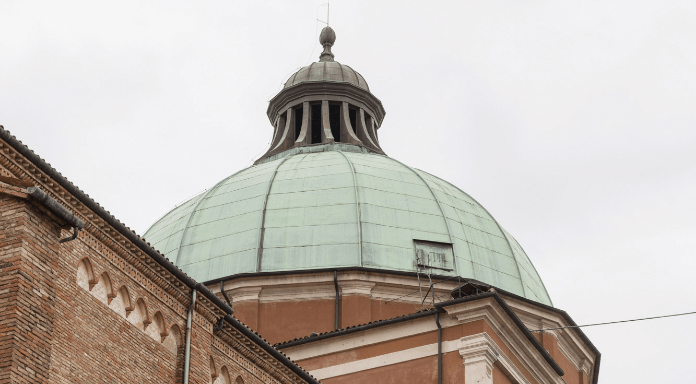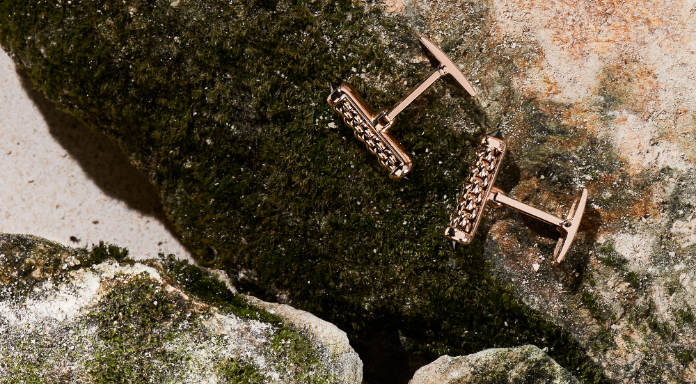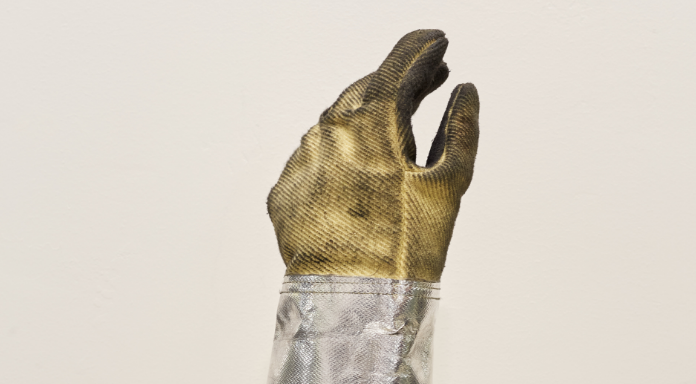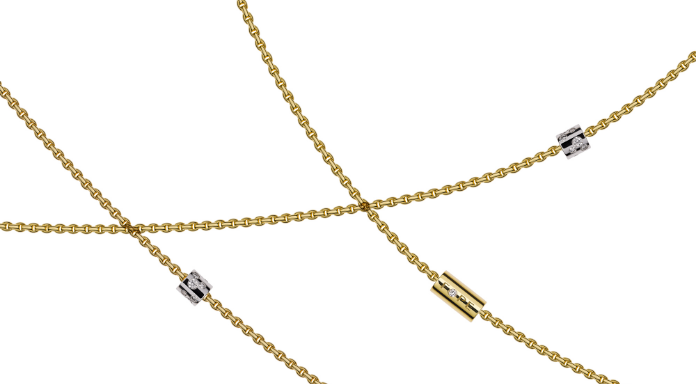Behind the scenes of Precious Flavours, a project by chef Lorenzo Cogo for FOPE
Born in Vicenza in 1986, he has trained as a chef in some of the best restaurants in the world, among which the Vue du Monde in Melbourne, the Ryugin in Tokyo, and The Fact Duck in London. For a long time, Cogo was a haute cuisine globetrotter, and he was awarded the prestigious Michelin star when he was only 25. In his instinctive cuisine influences discovered during his several experiences abroad. It was because of this fusion of local and international that FOPE asked Cogo to create 18 new dishes for their Everyday Journey 2021/22 campaign.
Marilisa Teatini Cazzola, FOPE’s Chief Marketing Officer and a member of the board of directors, converses here with Lorenzo Cogo on the subject of this evocative combination of jewellery and haute cuisine.
Marilisa Teatini Cazzola: When we began to imagine this collaboration of ours, one of the elements of common ground that became immediately evident between our company and your cuisine was this powerful dialectic of tradition and innovation. Your starting point was Vicenza, too, the local cuisine, and then you succeeded in finding a balance between local raw materials and the many styles of cooking you have discovered throughout the world. FOPE did more or less the same thing with its jewellery: every new generation has upheld the aesthetic values of Italian craftsmanship while using state of the art technology to earn a place in the international context. Some might think that every new generation at the head of a business, whether it deals in jewellery or food, will inevitably bring something new to the table. And yet it shouldn’t be taken for granted: individuals are the ones who bring change, and often as not to change you need to actually move, discover what exists elsewhere, basically you need to travel…
Lorenzo Cogo: It’s difficult to compare FOPE’s evolution to my own professional history. After all, your products are very recognisable, I’m thinking of the Novecento mesh, for example, that is known all over the world. For sure I pushed beyond tradition too, since my family manages a trattoria near Vicenza where they serve traditional local dishes. The way I see it, the thing we truly have in common is our tendency to seek out the essence of things, to overcome the superfluous, as well as our great care for detail. I think I am a genuine person, uncontrived, a genuineness I also see in FOPE jewellery. My cooking is straightforward, spontaneous, concrete. This is why I truly enjoyed reinterpreting your collections in my own language. And yes, travelling has always been very important to me.
MTC: And here we come to another important aspect of this collaboration of ours. Travelling is the central theme of Everyday Journey, FOPE’s 2021-22 campaign, but it is also a founding element in your work, we may call it a sort of distinguishing feature. Travelling is a discovery, a contamination, an encounter with different cultures. This is the idea at the heart of our campaign: FOPE jewellery allows people to freely express their identity, their culture, but also to part with it, to experiment with new aesthetic combinations. What role did your experiences abroad have in your search for a personal culinary language?
LC: I was lucky enough, and farsighted enough, to go abroad when I was still very young. In Australia I was confronted with a style of cooking that was entirely new to me, working in Michelin star restaurants with an innovative and brave approach to cooking. This allowed me to truly develop my skills, to discover my strengths and learn to really express myself. From that moment on, it became clear that travelling is crucial for me. Not only does it offer me the opportunity to expand my “mental pantry,” that is to say the ingredients I can use to create a dish, but also the chance to come in touch with different cultures, which in turn increases my appreciation of my own. It also gave me the edge over a certain type of conservative cuisine you often find in Italy.
MTC: Technology played a fundamental role in FOPE’s history. Using state of the art technological instruments is crucial to the development of our production techniques, creating jewellery that is well-finished in every detail. Just think of the Novecento mesh, now a veritable icon for our brand. In fact, come to think of it, our jewellery is more “technical” than it is “romantic” in a classical sense. In haute cuisine, too, technology has taken on an increasingly important role. Is this true for you as well?
LC: I did my schooling in the heyday of molecular gastronomy, when technology took precedence over everything, sometimes even over flavour. I have had the opportunity to work in one of the best restaurants in the world, where fun and applied technologies were the two most important aspects, so I recognise the appeal of this approach. However, over the last few years I have moved away from it, so much so that now my favourite method is grilling; I go so far as to consider charcoal an ingredient. My cuisine has become more homely, welcoming, artisanal. The dishes I created to offer my interpretation of the FOPE collection are intended to convey this sense of being artisanal while reproducing the shapes and the atmospheres evoked by your jewellery.
MTC: Another element connecting FOPE’s history and your professional development is certainly our shared ability for renewal. Being able to reinvent oneself is a crucial skill if you want to keep in step with the times and offer a modern product, in jewellery making as well as in haute cuisine. I am thinking of a few decisive moments for our company, especially the 1970s, when we went from making straps and cases for gold watches to producing jewellery with innovative technical features. How did you reinvent yourself throughout the various phases of your career?
LC: I’m the kind of person who always needs new stimuli, new challenges. I have always needed to become involved in different situations, find inspiration in other contexts than gastronomy, discover connections with other countries and other cultures. During my development I experienced many changes, often radical ones, but always dictated by the need to do something new, something more fun. Ironically, the pandemic offered me the enormous opportunity to start over and get out there again, it convinced me to bring cooking back to one of its fundamental functions: creating relationships between people. For a chef it is in no way easy to give up a Michelin star, and yet I believe that real opportunities aren’t connected with official recognition: you find them by listening to your instincts, by working hard. From this point of view, our paths are similar: we have both sought out our own dimension.
MTC: The Everyday Journey campaign revolves around the theme of travelling and can be considered an invitation to expose ourselves, in our everyday lives, to the standards of beauty of other cultures and traditions. FOPE has always combined this aperture towards the world with a great consideration for our territory: for Vicenza, where the company was founded and still has its main headquarters, and for Venice, where in 2015 we opened our first boutique in the iconic Piazza San Marco. The latter perfectly represents FOPE’s spirit: a blend of tradition and cosmopolitanism. For you, too, the Veneto region, and especially Venice, hold a special significance, in fact this is where you have opened your new restaurant. Basically, after travelling afar, we always end up coming home…
LC: To me, Venice is the most beautiful city in the world, the one with which I have the greatest affinity. I must admit that before I opened Dama [Cogo’s restaurant in Venice, ed.] I didn’t know the city all that well, I visited twice or maybe three times a year, but I hadn’t experienced it on a day-to-day basis. From a creative point of view, it is a truly stimulating place, possibly the most stimulating of all, a place I am now discovering little by little. In a certain sense, my gastronomic research progresses at the same pace as my discovery of the city. Besides, Venice is without a doubt part of my cultural heritage, of my historic roots, a constant, fundamental reference even in my cooking. In my interpretation of the FOPE collections, you can see evident allusions to the Venetian tradition, sometimes in the ingredients, others in more explicit references to our region’s typical dishes. After all, my cuisine has always been marked by a constant contamination between local and international gastronomy. And this is why I am so happy to bring the notions I have collected abroad into a new project here in Veneto.




